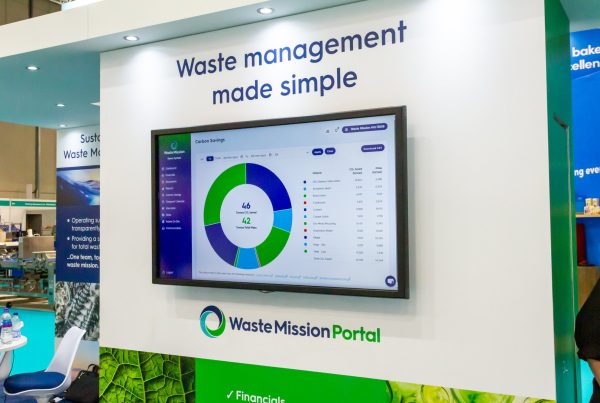Old batteries piling up in a workspace can feel like a real headache, but figuring out how to dispose of batteries doesn’t have to be a mystery. Whether you’re dealing with dead batteries from office equipment or battery packs from heavy machinery, this blog will give you all the information you need to dispose of them safely and with ease.
We’ll explore practical steps and insights to make battery disposal an easy part of your operations, keeping you safe and making your business more sustainable.
Why it’s Important to Dispose of Batteries Correctly
If you don’t dispose of batteries correctly, you may be asking for trouble. Batteries contain a variety of toxic chemicals and heavy metals, so are classified as hazardous waste: no battery of any kind must ever be put into bins for mixed recycling or general waste.
Batteries that are not disposed of properly can cause fires that could damage property, people and animals. They can also be a source of significant environmental contamination for soil and water.
What’s more, ignoring battery safety can put businesses on the wrong side of the law:
- UK businesses that manufacture, import or distribute batteries must follow the legislation set out in The Waste Batteries and Accumulators Regulations which make it compulsory for them to collect/take back and recycle batteries and accumulators.
- More general legislation such as the Environmental Protection Act 1990 places a ‘duty of care’ on businesses to dispose of hazardous waste such as batteries properly, with stiff penalties for any found breaking the law.
The risks of improper disposal
Material Focus reported that 1200 fires at waste sites in the UK in 2023 were due to improperly discarded batteries. The Environmental Services Association estimates the resulting fires cost fire services and waste operators some £158m a year.
Batteries play an important role in business operations – yet many workers are still unaware of the fire risks they pose.
The environmental and human impact
Old batteries that are discarded incorrectly can leak toxic materials, such as mercury, that can harm our environment.
For example, the toxic materials can:
- leak into waterways from landfill, contaminating aquatic life and fish stocks
- contaminate soil and potentially enter our food chain
- release toxic gases such as manganese dioxide, which can pollute the air and damage human health
The lead found in some batteries can damage the human nervous and reproductive systems. Mercury is a potent neurotoxin that can damage the brain, while Cadmium is a known carcinogen that causes respiratory damage.
Recovering valuable materials
When you recycle batteries, you help recover valuable, finite resources that can be used again. This reduces the need for new raw materials and supports a more sustainable resource loop that benefits people and the planet. As we have seen, recycling is essential to avoid serious fire risks and environmental damage.
Battery recycling programmes such as the one run by Waste Mission will ensure that all your batteries are handled safely and comply with the law.
- Alkaline batteries power many portable electronics. They contain zinc, manganese, and steel, and older ones may still contain small amounts of mercury.
- Lithium-ion batteries, which contain lithium, cobalt, and other rare metals, are used in power tools, medical equipment, mobile phones, laptops, and electric vehicles. They pose a serious fire risk, causing an estimated 48% of all waste fires in the UK.
- Lead-acid batteries, which contain toxic lead and sulphuric acid, are used in forklifts, vehicles, backup power supplies, and large battery packs.
- Nickel-cadmium (Ni-Cd) and Nickel-metal hydride (Ni-MH) batteries power industrial equipment, emergency lighting and two-way radios. Cadmium, in particular, is highly toxic.
- Zinc-carbon and Zinc-air batteries are created for specific uses, such as medical devices and industrial sensors. While they’re not as hazardous as other types, recycling them is still important.
Understanding Rechargeable Batteries
By choosing rechargeable batteries instead of single-use ones, you will use fewer batteries overall, which means using fewer new raw materials and less environmental damage. Rechargeables can be reused between 500 and 1,000 times, significantly reducing waste. And using solar-powered chargers can reduce your impact even further.
Rechargeable batteries are often lithium-ion types, such as those typically used in mobile phones. Other common types include nickel-metal hydride and nickel-cadmium batteries. Properly disposing of old rechargeable batteries that no longer work is just as important in terms of their potential risks to humans and the environment.
How to Help Your Team Dispose of Batteries Properly
If you are ready to start planning how to dispose of your business’s batteries, here are some helpful points to remember.
- Start by identifying the types of batteries you use through a waste audit.
- Set up collection points where your staff can safely drop off used batteries. Damaged batteries should be stored separately – or sealed in a clear plastic container to prevent harmful substances from escaping.
Bins should be marked with different battery types, allow airflow through them, and be made of materials such as plastic that do not conduct electricity.
- Give your staff proper training on battery disposal rules and fire safety.
- Team up with a registered recycling firm such as Waste Mission to ensure your battery waste is handled safely and promptly.
It is also worth noting:
- If your business sells more than 32kg of portable batteries annually, you must offer free collection services for used batteries.
- Many waste collection services will provide on-site collection bins for you.
- Specialists who handle hazardous waste must be called in to dispose of larger battery waste, such as electric vehicle batteries or industrial power units.
The Business Case
Proper battery disposal is not just about convenience; it’s about protecting people and the planet. You are also helping to recover valuable materials, ultimately benefiting the environment and the economy.
Following battery disposal rules isn’t just about compliance either. It’s about building your name as a responsible business – and building a future that’s a few shades greener.
To find out more about Waste Mission’s battery recycling and disposal services, book a waste review today.





